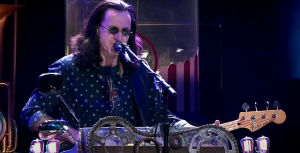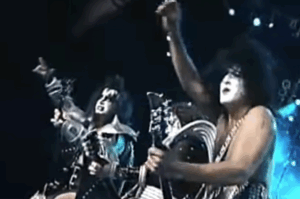Jo Burt Opens Up: The Chaotic Reality of Touring with Black Sabbath

via Jo Burt / YouTube
In the late 1980s, Jo Burt found himself in an unexpected position — holding down the bass for one of rock’s heaviest and most storied bands. When Black Sabbath prepared for their Eternal Idol tour, the lineup was in flux, and Burt was quickly brought in to fill the bassist role. There was little time for preparation; he was thrown straight into rehearsals, learning the set and adapting to the band’s famously dense sound. Despite the pressure, Burt’s professionalism and adaptability allowed him to find his footing in a lineup that included Tony Iommi, Tony Martin, Jeff Nicholls, and drummer Terry Chimes.
Burt’s gear setup reflected Sabbath’s thunderous legacy. According to Power of Metal, he used a rig modeled after Geezer Butler’s — three Ampeg SVT amps paired with massive 8×12 cabinets. This setup gave him the deep, roaring tone that defined the band’s live performances. For a brief moment, it seemed like Burt was stepping into a promising chapter with one of the biggest names in heavy metal history.
However, what lay ahead wasn’t the rockstar fantasy most would imagine. Behind the scenes, chaos, poor management, and abrupt decisions created a sense of uncertainty that would ultimately shape Burt’s short-lived but unforgettable tenure with Black Sabbath.
Humor, Brotherhood, and Unease
In a candid interview with Guitar World, Burt recalled the camaraderie that held the touring crew together during those early days. “Travelling was absolutely fine,” he said. “Me and Terry Chimes had met when he was with The Clash, and I was with Tom Robinson. Tony Martin was a newbie too, so there was some nervous energy on the bus.” The chemistry between the band members and crew helped maintain a sense of stability despite the looming unpredictability that often surrounded Sabbath tours.
Jeff Nicholls, the band’s longtime keyboardist, was a grounding presence for Burt. He described Nicholls as “a funny guy and very friendly,” emphasizing that despite years of performing offstage, Nicholls had no ego and was simply “a very present friend.” Even Tony Iommi’s sharp sense of humor, which Burt fondly referred to as “that classic Brummie wit,” lightened the mood during long stretches on the road. With comfortable accommodations and a crew that got along well, the tour initially felt promising.
Yet beneath the laughter and four-star hotels, there were cracks forming. The organization of the tour and its finances were far from stable, and Burt had little idea that the comfortable ride would soon end abruptly and dramatically.
Chaos and Lost Gear
The Eternal Idol tour came to an unexpected halt. Burt vividly recounted the moment everything fell apart: “It only felt lean when tour manager Richard Cole dragged me out of the bus, still in my sleeping bag, and told me, ‘Hurry up! We’re all going home.’” Without warning or explanation, the tour was over. Equipment was seized, payments were missed, and the band’s future seemed uncertain.
The financial fallout was immediate. The sound and light company, having gone unpaid, impounded all of the tour’s gear — a move that was unfortunately common during that era of rock touring. Burt lost much of his equipment in the process, though he later managed to recover his prized fretless bass. It was a jarring experience that laid bare the realities of the industry, even for a band as iconic as Black Sabbath.
What should have been a high point in Burt’s career instead became a harsh lesson in the volatility of rock’s touring world. The sudden collapse of the tour underscored the fragile infrastructure supporting even the biggest acts — a reminder that fame doesn’t always equal stability.
The Silence That Followed
Burt’s time with Black Sabbath ended much like the tour itself — suddenly, and without closure. “People don’t get sacked from Sabbath; they just don’t get spoken to again,” he said. The comment, both humorous and revealing, summed up the band’s unspoken code when it came to personnel changes. There were no formal goodbyes, no explanations — just silence.
This quiet departure mirrored a pattern that ran through Sabbath’s long history of lineup changes. Over the decades, countless musicians had come and gone, often without warning or acknowledgment. For Burt, the lack of communication was emblematic of a deeper truth about life as a hired gun in the rock world: loyalty and stability are rare commodities.
Reflecting years later, Burt viewed the experience not with bitterness, but with clear-eyed realism. His brief stint with Sabbath offered a firsthand look at both the thrill and the chaos of rock’s upper echelon. It was, in many ways, a microcosm of the 1980s touring scene — larger than life, wildly unpredictable, and defined by the thin line between success and disaster.











